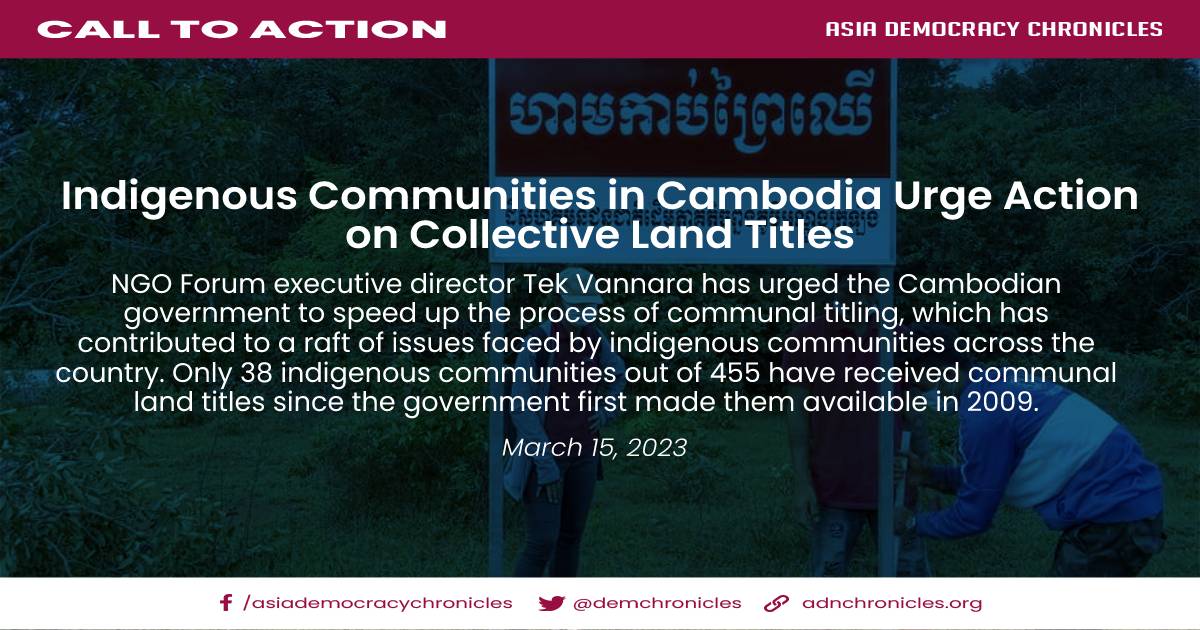According to a Ministry of Land Management report from 2022, the 38 titled communities received CLTs covering just over 39,000 hectares of land.
The slow pace of communal titling has contributed to a raft of issues faced by indigenous communities across the country, including land grabs that have resulted in the loss of culture, tradition, and sacred places.
NGO Forum executive director Tek Vannara, urged the government to speed up a process that has long been criticized for its slow pace and onerous requirements.
“The Cambodian government has committed to providing collective land titles to around 10 indigenous communities each year, but as we see that, this commitment hasn’t been reached and the procedure seems to be getting slower from one year to the next,” said Vannara.
The process currently requires cross-collaboration between the Ministry of Rural Development, Ministry of Interior and Ministry of Land Management, explained Vannara. The Ministry of Environment, meanwhile, must confirm the locations of spirit forests — some of which are found to fall under already designated conservation land. Then, there is often negotiation to be had between companies that had already received government land concessions and the local communities. All of this, said Vannara, makes for an onerous process.
Some 24 distinct indigenous communities live in 15 provinces, making up 1.34 percent of the population, according to the Ministry of Rural Development’s Secretary of State Chhan Darong. Before becoming eligible for CLTs, indigenous groups must be formally registered. According to Darong, only 155 indigenous communities have been formally registered.
The UN Human Rights Office in Cambodia has estimated that at the current rate of registering indigenous communities, it would take more than 100 years to register the remaining communities.
Indigenous people told CamboJA, they are frustrated by the slow pace of government progress.
Phorn Sotheara, a Tumpuon community leader in Ratanakiri, said that the lack of titling has led to significant culture loss.
“The indigenous peoples are facing the loss of their culture [and] identity. They are losing slash-and-burn agriculture land, spirit forests, and more if the Cambodian government continues to delay providing the collective land title to indigenous people in the country,” he said.
“If the Cambodian government continues to postpone this work to provide land title to indigenous people, they will have no land left to register because all will be lost due to illegal grabbing.”
Kroung Tola, a member of the Bunong minority in Mondulkiri, told CamboJA that without legal rights to their land his community faces threats from illegal land grabs and local corruption.
“If the governor or NGO has no ambition or commitment to obtain collective land title for indigenous people — not only for Mondulkiri province but for the whole country — we are facing to lose our traditional culture, land and have no freedom to depend on the land,” said Tola, who lives in Pech Chreada district’s Bousra commune and said that communities like his can’t afford to wait 100 years.
“In the Constitution, the law about protecting indigenous people should be deleted. Because 100 years from now the woods and natural resources will all be dead,” he said.
“In 100 years, there will be nothing inside the forests, so the governor might as well not bother to register the collective land for us because it is not important anymore.”



















